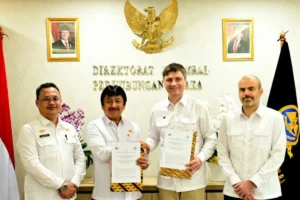Indonesia and Slovakia Strengthen Cooperation to Protect Child Victims of Terrorism

Jakarta, The Gulf Observer: Indonesia’s National Counterterrorism Agency (BNPT) and Slovakia are enhancing their bilateral cooperation to protect child victims of terrorism and combat terrorism at national, regional, and global levels.
At the second Joint Working Group (JWG) meeting held in Jakarta on Friday, BNPT International Cooperation Deputy Andhika Chrisnayudhanto emphasized the importance of focusing on the protection of children exposed to terrorism, highlighting specific cases such as the RD case in Slovakia. He stressed that children are victims in these situations, not perpetrators, and called for this issue to gain more international attention.
“We also focus on protecting children exposed to conflict. The children are victims, not perpetrators, so we hope this issue can become an international concern,” Chrisnayudhanto stated.
The Deputy further noted that while counterterrorism measures have made progress, the involvement of women and children as both victims and perpetrators of terrorist activities is a growing challenge in global counterterrorism efforts.
Slovak Police Anti-Terrorism Center Senior Specialist Major Martin Baran acknowledged Slovakia’s struggles with terrorism, particularly from self-radicalized individuals and returning refugees from conflict zones. He highlighted Slovakia’s efforts to monitor online radicalization, employ advanced technology, strengthen border control, and share intelligence as essential components of preventing extremism and supporting deradicalization.
Both parties at the meeting agreed on the need for comprehensive standards to address terrorism, ranging from prevention to victim rehabilitation.
Since the initiation of their cooperation in 2019, Indonesia and Slovakia have committed to sharing experiences and strategies, especially in child protection and strengthening deradicalization systems. The collaboration between the two countries is expected to serve as a model for productive international cooperation in the fight against global terrorism.
A follow-up meeting will be held to assess the implementation of the agreed agenda and review the success of ongoing programs.


